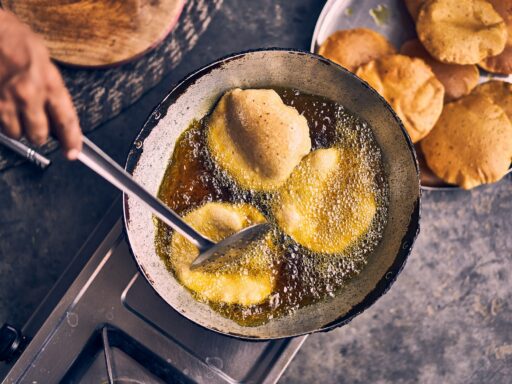A mainstay of South Asian cuisine for a long time is the fragrant and savory rice dish called biryani. Originating in Pakistan and India, biryani is a popular dish all over the world that is characterized by a special blending of rice, spices, and meat or veggies. The variety of this dish—various regional versions exist, each adding a unique twist—is what makes it stand out. Everybody can enjoy biryani, regardless of their preference for the gentler Lucknowi kind or the fiery Hyderabadi variety.
We’ll look at how to prepare a traditional biryani in this post that will wow your family and guests. This is a standard chicken biryani recipe, but if you’d rather make it vegetarian, you can definitely use lamb, beef, or even veggies in place of the chicken.
Components of biryani
To marinate the chicken:
One kilogram of chicken, medium-cut
one cup of yogurt
One spoonful of pasted ginger
One spoonful of pasted garlic
Two tsp red chili powder, or more or less to taste
One tsp powdered turmeric
One tsp powdered garam masala
Add salt to taste.
One lemon’s juice
freshly cut mint and coriander leaves
Regarding the Rice:
30 minutes of rinsed and soaked basmati rice yields two cups.
Four cups of water
two to three bay leaves
Four or five green cardamoms
Four to five cloves
One-inch cinnamon stick
Anise with one star
Add salt to taste.
To Prepare the Biryani:
Two big onions, cut thinly
two chopped tomatoes
1/4 cup ghee or oil
1/4 cup of heated milk with 1/2 teaspoon of saffron strands soaked in it
1/4 cup fried onions (for garnish only, if desired)
Two hard-boiled eggs (for garnish, if desired)
Method by Step Recipe for Biryani
Step1: Give the chicken a marinade
For a biryani to have taste, marinating is essential. First, give the chicken parts a thorough cleaning before putting them in a big basin. Add yogurt, chopped coriander and mint leaves, red chili powder, turmeric powder, garam masala powder, yogurt, ginger paste, and garlic paste. Make sure the marinade coats the chicken pieces evenly by thoroughly mixing everything. For optimal flavor, cover the bowl and place it in the refrigerator for at least two hours. If possible, let it marinade overnight.
Step 2: Make the rice
Because of its aromatic qualities and lengthy grains, basmati rice is perfect for biryani. To keep the rice from being sticky, rinse it under cold water until the water runs clear, eliminating any excess starch. Soak the rice for around half an hour after rinsing.
Add the bay leaves, green cardamoms, cloves, cinnamon stick, star anise, and salt to a big pot of boiling water. Pour in the soaked rice and bring the water to a boil. Cook for 7 to 8 minutes, or until the rice is 70 to 80 percent done. As the rice will continue to cook with the chicken, it should still be slightly firm. After draining, set the rice aside.
Step 3: Let the onions fry.
Fried onions are one of the main ingredients that contribute to the unique flavor of biryani. Add the thinly sliced onions to a large skillet with heated oil or ghee. Fry, being careful not to burn them, until they are crispy and golden brown. When finished, take out the onions and place them on a paper towel to drain. Some of these fried onions should be saved for garnish.
Step 4: Let the Chicken Cook
Add the chopped tomatoes to the pan with the remaining oil or ghee from frying the onions, and sauté them until they become soft. After that, place the marinated chicken in the pan and heat it to medium. Until the chicken is thoroughly cooked and browned, stir it occasionally. As the chicken cooks, the yogurt will help to make a creamy sauce. After the chicken is cooked, remove from the heat and adjust the seasoning to taste.
Layer the Biryani in Step Five.
It’s time to layer the biryani now that the chicken and rice are prepared. Place a layer of the cooked chicken in a big saucepan with a heavy bottom. Cover the chicken with an even layer of rice, then top with a scattering of the chopped coriander, mint leaves, and fried onions. Continue layering, and then add one last layer of rice.
Pour the milk infused with saffron over the uppermost layer of rice. A small amount of ghee can be drizzled on top for additional richness. Add some extra fried onions and boiled eggs to the top if you really want to kick it up a level.
Step 6: Steaming or Dum Cooking
To keep the steam within, place a tight-fitting lid on the saucepan. To stop steam from escaping, you can use a clean kitchen towel and a hefty lid, or you can cover the borders with dough. The biryani should be cooked for 20 to 25 minutes on low heat. This cooking technique, called “dum,” makes for a lovely blending of tastes.
Step 7: Arrange and Accent
Once the biryani is cooked, carefully take off the lid and make sure it’s done. The chicken should be soft and flavorful, and the rice should be fluffy. Serve the biryani hot, topped with the boiled eggs, fresh coriander, and the saved fried onions.

Suggestions for the Ideal Biryani
Use Aged Basmati Rice: The quality of the biryani increases with the length of the rice grains. You can achieve the ideal, aromatic, non-sticky texture using aged basmati rice.
Cook the Rice Al Dente: Keep in mind that before layering, the rice needs to be 70–80% cooked. The dum procedure will cause overcooked rice to become mushy.
The secret to the best-tasting chicken is to give it plenty of time to marinade. An overnight marinade greatly improves the flavor.
Saffron for Authenticity: Adding that distinctive golden hue to your biryani, soaking saffron in heated milk brings out its color and aroma.
Add Depth: Don’t omit the fried onions; their caramelized sweetness counterbalances the dish’s spiciness.
Last Words
Biryani is a celebration of flavors, culture, and tradition rather than just a food. It’s possible to replicate this famous dish in your own home with a little perseverance and attention to detail. Biryani is always a hit, whether it’s served for a big occasion or a family get-together. So get your ingredients ready, cook according to this recipe, and savor the amazing flavor of homemade biryani!







